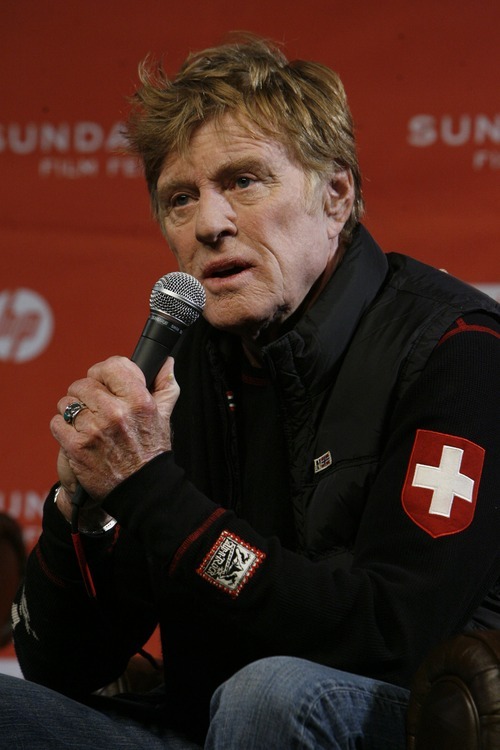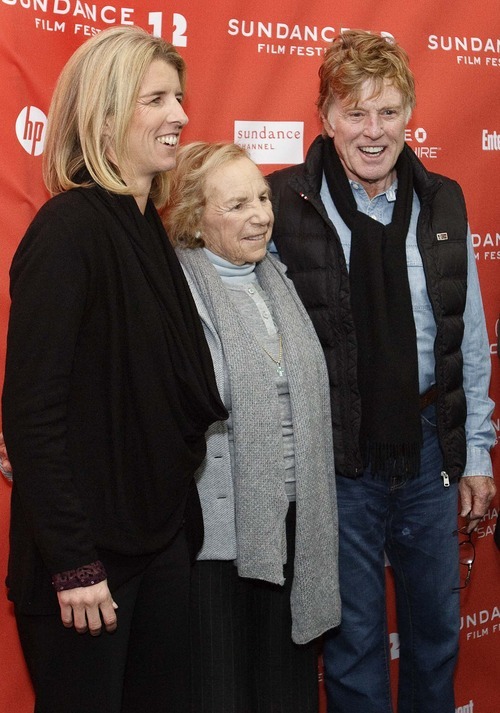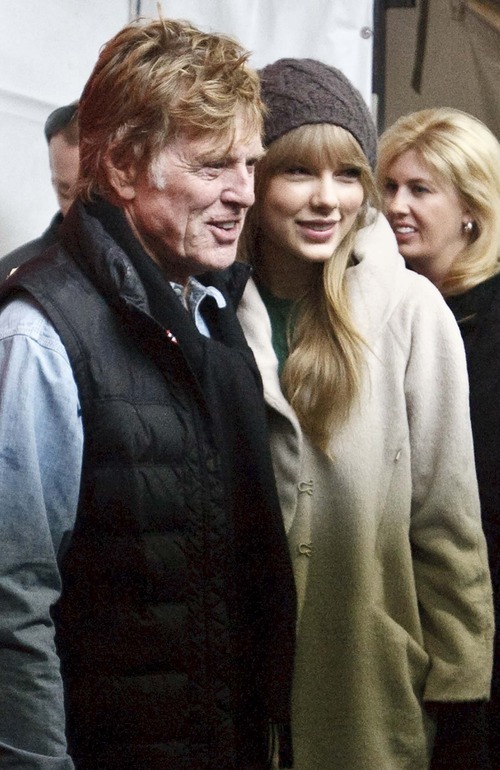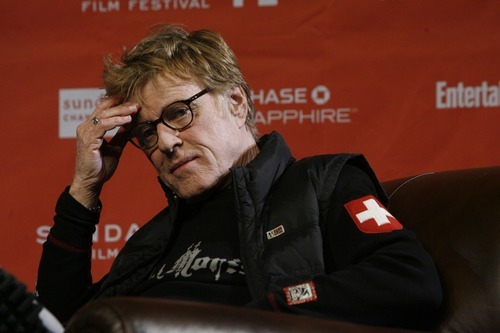This is an archived article that was published on sltrib.com in 2012, and information in the article may be outdated. It is provided only for personal research purposes and may not be reprinted.
For Robert Redford, exposing the story of the Watergate break-in — and the ensuing scandal of political dirty tricks and dirty money that engulfed Richard Nixon's presidency — was never about politics.
It was about the journalism.
"I just happened to be a very fortunate person that I stepped into something that turned out to be journalism's glory moment, journalism's high point," Redford told me last weekend in an interview, over the phone from Baja California, where he's currently shooting a movie.
What Redford stepped into was how Bob Woodward and Carl Bernstein, diametrical opposite characters forever joined at the byline, dug deep to get the news story that brought down a presidency — a story Redford told as producer and co-star of the 1976 classic "All the President's Men." (The movie will screen Saturday at Redford's Sundance resort, up Provo Canyon, to mark the 40th anniversary this month of the initial burglary that started it all.)
Politics was already on Redford's mind when the Watergate story broke in 1972. He had just finished making the satirical "The Candidate," in which he played a handsome but lightweight Senate hopeful — and was preparing to shoot "The Way We Were," which was as much about the blacklisting era as it was the onscreen romance between him and Barbra Streisand.
Redford said he got a sense from a group of political reporters, whom he met while doing a prank "whistle-stop" tour through Florida to promote "The Candidate" in July 1972, that there was more to Watergate than the public knew.
"They were gossiping about the break-in that had just happened two weeks before that, on June 17. I said, 'Hey, you guys, what happened with that deal?'" Redford said. "They all had this cynical attitude with each other, like they knew something that they were not really going to go into. It was just a look, a vibe. … I started to press them, and what started to float up was that something was going on that had nothing to do with whatever it appeared to be in the press. … I said, 'What are you going to do about it?' Then they really got on my case, as being naive and like a Boy Scout."
The political reporters told Redford that George McGovern, the South Dakota senator running against Nixon, was "going to self-destruct, and Nixon will win in a landslide. And nobody wants to get on the wrong side of this guy when he gets into office, because he's got a switchblade mentality."
Redford had encountered Nixon growing up in California, when Nixon was a state senator. At age 13, Redford said, he received an award that Nixon presented. "I got a vibe from him, and I said, 'This is a bad guy,' " Redford said.
Redford came home to Utah after the whistle-stop tour and read more Washington Post stories in The Salt Lake Tribune. He noticed the stories always carried two names in the byline. He followed the story all summer as these two reporters kept uncovering information about slush funds and dirty tricks involving Nixon's re-election campaign.
"I was riding along with it, like a cheering section," he said.
Then (and fans of "All the President's Men" will know this moment) in August, the reporters overreached on one story involving grand-jury testimony and suffered a backlash from Nixon's side. Redford then read an article that profiled the two reporters: Woodward and Bernstein.
They were as different as two men could be. Bernstein was a New Yorker, a Jew and a radical liberal. Woodward was from Illinois, a WASP and leaned Republican. And they didn't like each other much.
There, Redford thought, was the makings of a good movie.
"I thought that I would love to make a little black-and-white film, with two unknown actors," he said. "I was more interested in the chemistry of them having to work together, with those disparate sides of themselves."
In December 1972, when Redford (then shooting with Streisand in upstate New York) called Woodward to arrange a meeting, the reporter "just blew me off." Redford let it drop and moved on to shoot "The Sting" in Chicago.
In February 1973, when Watergate burglar James McCord wrote a letter to Judge John Sirica confessing to his crimes and acknowledging a White House cover-up, Redford tried again to contact Woodward. This time, Woodward invited Redford to D.C. to meet.
Redford's description of his first meeting with Woodward sounds like something out of a spy novel — or a scene from "All the President's Men." They met at a movie theater, but Woodward said, "Not here," and told Redford to meet him at a hotel bar 45 minutes later.
When they finally got to talk, Woodward apologized for his past aloofness. "He said, 'We got your message, and we thought we were being set up,' " Redford said. Woodward said that he and Bernstein were under surveillance and that Nixon was going after them and the Post.
In March 1973, Woodward and Bernstein met for hours with Redford and screenwriter William Goldman ("Butch Cassidy and the Sundance Kid"). Goldman later fashioned a screenplay — which, according to Michael Feeney Callan's biography of Redford published last year, Redford and director Alan J. Pakula heavily reworked after meetings and ride-alongs with Woodward and Bernstein. (The late Nora Ephron, married to Bernstein at the time, also took a swing at a screenplay, Callan wrote.)
Redford said he told Woodward and Bernstein at the time, "I just want to make a film about what you guys did … the part that, I think, no one will know about." The reporters, who had just signed a book deal, had planned to write it from the viewpoint of the burglars. Their book agent, Alice Mayhew, liked Redford's idea better.
Redford maintained the focus on Woodward and Bernstein, even as the Watergate scandal mushroomed to impeachment hearings and Nixon's resignation.
"I tried to defend our position, saying 'It's not about what the public knows, it's what the public doesn't know," Redford said. "It's about investigative journalism, and the work these guys did that other people didn't do. It's a thriller."
The movie, released four years after the break-in, went on to win four Oscars — including a supporting-actor win for Jason Robards' portrayal of editor Ben Bradlee and an adapted-screenplay Oscar for Goldman (the only screenwriter credited) — and scored with critics and audiences.
Redford, who has a distaste for sequels or remakes, recently was cajoled to return to Watergate — to produce a documentary, "All the President's Men Revisited," that will air on Discovery Channel next January. He recently reunited with Woodward, Bernstein and Bradlee for a sit-down interview for the film; another interview, with Redford and co-star Dustin Hoffman, will be shot soon.
The film will also feature current media figures, including Jon Stewart and Rachel Maddow. "I told 'em, 'You've got to get Roger Ailes,' " Redford said.
Forty years later, Redford finds journalism isn't reaching the lofty heights Woodward and Bernstein scaled when their reporting led to a president's downfall.
The authority of the anchorman — someone who could definitively tell you "that's the way it is" (as Walter Cronkite did) — is long gone. Today, Redford said, an anchor "is telling you one thing, and the news crawling underneath is telling you something else."
If there's a current lesson to be learned from Watergate, Redford said, "it's all about the truth. It's really about how important searching for the truth is, and how digging for the truth then is different than it is today." With the explosion of cable TV, talk radio, Internet and other news sources, he said, "it's actually gotten harder and harder for people to recognize where the truth is ."
Sean P. Means writes The Cricket in daily blog form at http://www.sltrib.com/blogs/moviecricket. Email him at movies@sltrib.com. Follow him on Twitter @moviecricket or on Facebook at http://www.facebook.com/seanpmeans. —
'All the President's Men' at Sundance
A screening of the 1976 Watergate drama "All the President's Men," starring Robert Redford and Dustin Hoffman.
When • Saturday, June 30, at 7:30 p.m.
Where • Screening Room, Sundance resort, Provo Canyon.
Admission • Free.









